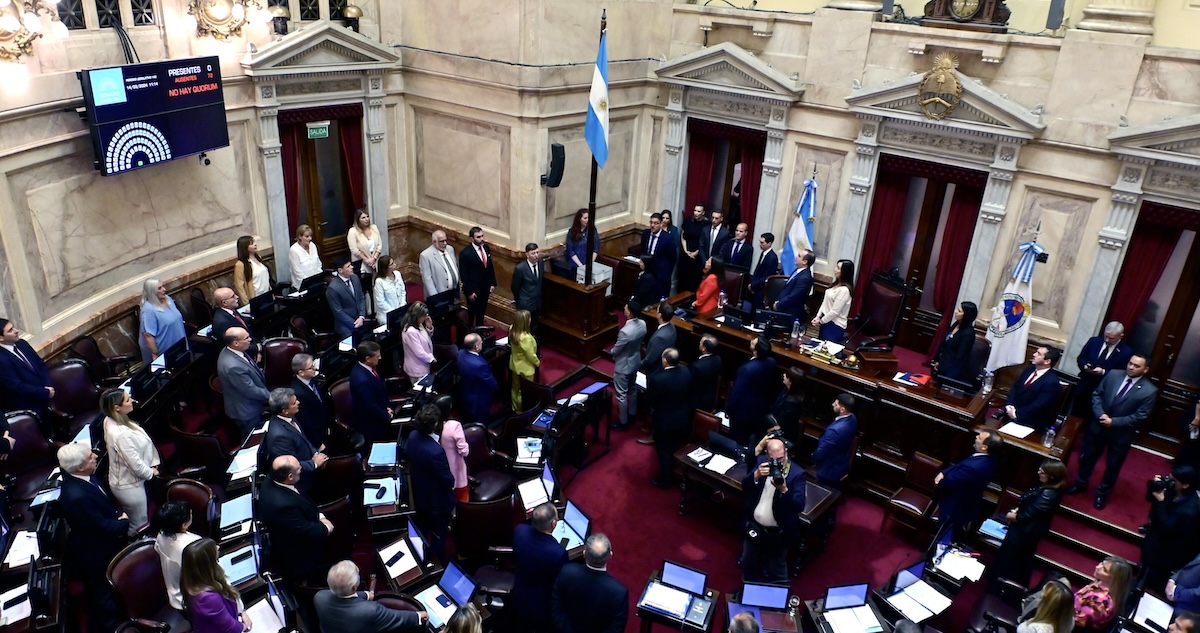Loading player
On Thursday the Argentine Senate voted with a large majority to annul the Decree of Necessity and Urgency (DNU) with which in December the newly elected ultra-liberal president Javier Milei had deregulated various sectors of the economy, including the real estate rental market, retail sales food retailing, land distribution and air travel. It is news because it is the first time that the Argentine Senate has rejected a president’s DNU, and because what happened once again shows Milei’s difficulties in putting his controversial electoral program into practice while having to deal with a Congress that is not favorable to him .
The DNU was rejected in the Senate with 42 votes against, while only 25 were in favor and there were 4 abstentions. In the Senate, Milei’s right-wing coalition, La Libertad Avanza (LLA), controls less than 10% of the seats: Milei hoped to also obtain the support of the centrist opposition, which however in the end voted together with the left-wing coalition led by Peronist party Union por la Patria (UP).
Various senators they argued that the DNU, containing over 300 articles relating to very different subjects, was too vast to be approved by parliament without a broader discussion on the merits. Others said they believed that some passages were unconstitutional, because the text of the DNU contains provisions that would be difficult to consider compatible with the urgency that a DNU must have by constitution. Among other things, the DNU establishes a “public emergency” in the country for two years, until December 31, 2025; revokes dozens of laws relating to the regulation of various economic sectors and the protection of workers; reduces the power of unions and limits the right to strike. It also repeals a law that prevented the privatization of state companies.
The DNU are a type of rule foreseen in the Argentine constitution, similar to our law decrees: they are adopted for emergency reasons, they come into force immediately but have provisional validity, in the sense that they must then also be approved by parliament which must convert them into law . In the Argentine case, it is sufficient for one of the two houses of Congress to approve the DNU to consider the decree valid. This means that the rules on deregulation contained in the measure will be in force until the Chamber of Deputies expresses its opinion, which is required to do so within a few weeks and where Milei could have some chance of obtaining a favorable vote: here Milei controls the 15 % of seats, but he may be more successful in convincing centrist MPs to vote with his coalition.
The DNU is important for Milei for two reasons. The first is that it itself contains many measures that your government intends to introduce to achieve its ambitious electoral programme. The second is that it lays the legal foundations for many other measures that are instead contained in the so-called “omnibus law”, a massive 664-article bill that contains an extensive set of structural reforms that, if approved, would bring further big and controversial changes in economic, fiscal, social and administrative matters. The government presented it as the only way to revive Argentina’s economy, which for several years has been going through a very serious economic crisis, with inflation at 147 percent and rampant poverty.
The omnibus law was submitted to Congress as a bill on 27 December: it provides, among other things, for an important electoral reform, the privatization of almost forty state companies (made possible, precisely, by the previous passage of the DNU) and the increase in penalties for those who organize unauthorized demonstrations. The law also requests a temporary transfer of power from parliament to the president for reasons of “public emergency”, something that is worrying the opposition due to the possible centralization of powers in the figure of Milei.
In particular, as mentioned, the DNU eliminates a law that prohibits the privatization of state companies: if the DNU were no longer valid, all the privatizations of state companies present in the omnibus law would not be possible.
Milei is also struggling to find a sufficient number of parliamentarians who want to support the omnibus law, and has therefore been working for weeks to reach an agreement with the center parties, which are part of the opposition but which he believes can be convinced to support liberal measures. At the beginning of February, in the context of these negotiations, the government had already agreed to thoroughly amend the omnibus law, removing two thirds of the initial 664 articles. Parliament had then agreed to vote on the law, but many of the proposals that Milei cared about most (including the expansion of presidential powers in economic matters) were then rejected in an article-by-article vote. His coalition subsequently withdrew the law, accusing the center parties of having “betrayed” them.
The government has since entered into intense negotiations with Argentina’s 23 provincial governors – none of whom are members of La Libertad Avanza – in an attempt to exert influence on parliamentarians through them. His goal is to find enough votes to introduce a shortened version of the omnibus law, containing 269 articles aimed, among other things, at privatizing several state-owned companies, expanding presidential powers and replacing the system for calculating pension increases .
